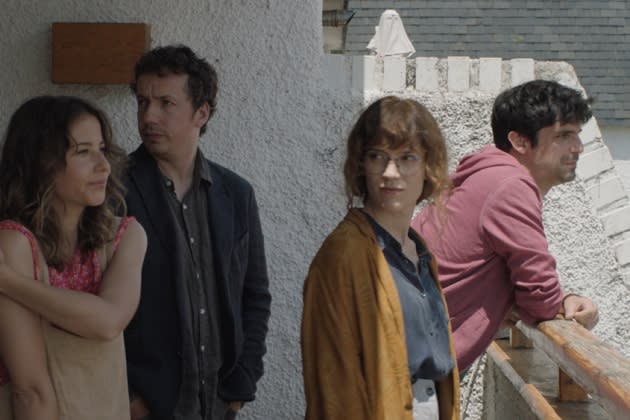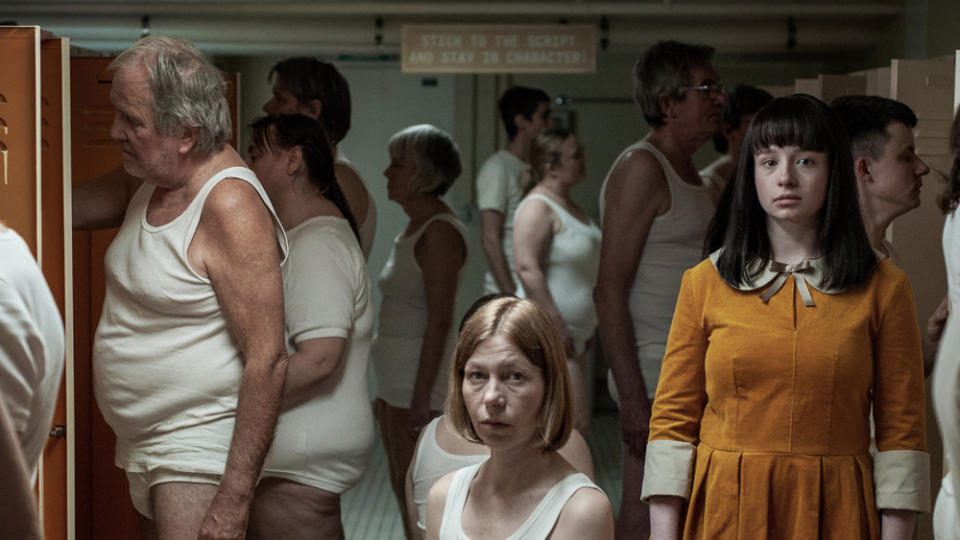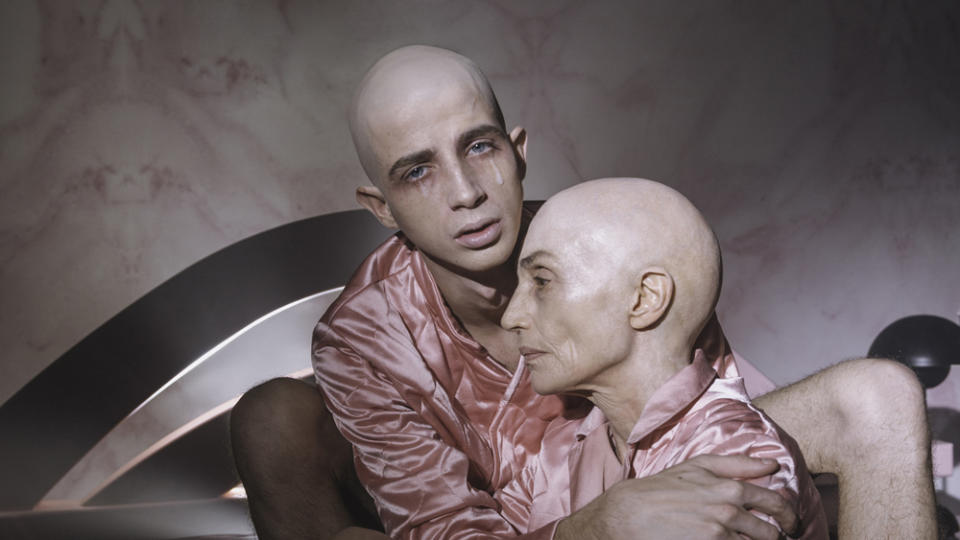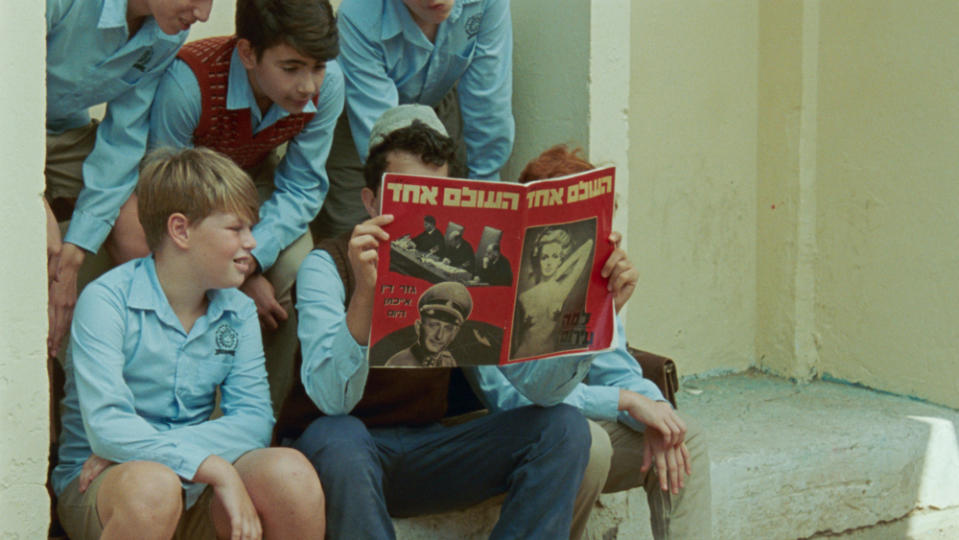Karlovy Vary Film Festival Lineup Features 27 World Premieres, Three International Premieres

Thirty-three films comprise the eclectic lineup for the 56th Karlovy Vary Intl. Film Festival, the programming team led by the artistic director Karel Och revealed Tuesday. The selection includes 27 world premieres, three international premieres, and three European premieres, covering five continents.
In addition to the Crystal Globe Competition and Special Screenings section, KVIFF’s new competition, Proxima, will make its debut in this year’s edition. Proxima aims to be “an inclusive space for pictures by young filmmakers and renowned auteurs alike, presenting bold works that defy categorization,” the festival said. In contrast to the East of the West competition, which it replaces, Proxima has no geographical restrictions. (East of the West was for films from Central and Eastern Europe, and the Middle East.)
More from Variety
'Another Spring' Acquired by Taskovski Films Ahead of Karlovy Vary Premiere (EXCLUSIVE)
The Match Factory Boards 'The Ordinaries' Ahead of Karlovy Vary Competition Screening (EXCLUSIVE)
Karlovy Vary Film Festival Launches New Talent Platform, Hosts Odesa Industry Screenings
Thirteen titles in the official selection are directed by filmmakers who have competed in KVIFF before. Nine films are debut features. Melodramas, dystopian sci-fis, romantic comedies and essay documentaries are part of the wide-ranging lineup.
“From the 1,500 films that have been submitted this year, we have chosen 33 brand new works of cinema that offer the accurate reflection of our taste – a taste derived from a belief in a meaningful edginess and the championing of new means of cinematic expression that nonetheless do not stand in opposition to the audience’s receptiveness and inclinations,” Och said.
CRYSTAL GLOBE COMPETITION
“America”
Director: Ofir Raul Graizer
Israel, Germany, Czech Republic, world premiere
Eli works as a swimming coach in Chicago but news of his father’s death necessitates his return to his native Israel. His decision to contact a friend from his childhood sets in motion a chain of events that have a lasting impact on everyone’s lives. An affectionate tribute to 60s and 70s cinema and an enchanting tale of love and friendship.
“Chemi otakhi” (“A Room of My Own”)
Director: Ioseb “Soso” Bliadze
Georgia, Germany, world premiere
Tina, a young woman who has lost her way in life, rents a room from the vibrant Megi, thanks to whom she gradually starts to discover what it’s like to be free and to be able to make her own decisions without being reliant on men. The film portrays millennials in contemporary Tbilisi and points to the influence of patriarchal thinking on Georgian society.
“Edna provintsialna bolnitsa” (“A Provincial Hospital”)
Director: Ilian Metev, Ivan Chertov, Zlatina Teneva
Bulgaria, Germany, world premiere
A COVID ward in a provincial hospital in Bulgaria. This observational documentary draws our attention to the country’s antiquated healthcare system and reminds us of our attitudes at the time when faced with an unknown threat. A survey of the bleak goings-on in an underfunded facility where, even when looking death in the face, people still manage to find their sense of humor.
“Fucking Bornholm”
Director: Anna Kazejak
Poland, international premiere
Two families who have known each other for years spend the long May weekend camping together as usual on the idyllic Danish island of Bornholm. However, instead of the relaxation they had anticipated, the holiday turns into purgatory… An acerbic Polish comedy on the pitfalls of raising children, midlife crisis and partnership discord.

Courtesy of Karlovy Vary Film Festival
“Hranice lásky” (“Borders of Love”)
Director: Tomasz Wiński
Czech Republic, Poland, world premiere
After years together, Petr and Hana share their unspoken erotic fantasies. What begins as an innocent conversation gradually turns into curious experimentation with a non-monogamous approach to their relationship. This debut by Tomasz Wiński explores various forms of intimacy and the possibilities of its depiction on the big screen.
“Isihia 6-9” (“Silence 6-9”)
Director: Christos Passalis
Greece, world premiere
Aris and Anna meet one evening in a half-abandoned town surrounded by antennas. In this strange, dreamlike world the two solitary souls gradually start to develop feelings for one another… A melancholic love story with a mesmeric atmosphere and striking visuals that proves Greek cinema has lost nothing of its originality.

Courtesy of Jonas Ludwig Walter
“The Ordinaries”
Director: Sophie Linnenbaum
Germany, international premiere
Paula is a supporting role aspiring to become a main character. Yet, just before her final exams, her emotive music generator suddenly starts playing up, which presents a major problem for her. No starring role can survive without a heartrending accompaniment from the strings. A film about what it’s like to live in a film. An ode to cinema, a whirl of ideas, and playfulness in every take.
“Slovo” (“The Word”)
Director: Beata Parkanová
Czech Republic, Slovak Republic, Poland, world premiere
Beata Parkanová, the filmmaker behind “Moments,” returns to Karlovy Vary with a vivid portrait of the family of notary Václav Vojíř, a small-town moral authority, and his selfless wife Věra. This intimate drama, whose protagonists undergo an ordeal in the summer of 1968, is reinforced by finely wrought, exquisite performances from Martin Finger and Gabriela Mikulková.
“Tabestan Ba Omid” (“Summer with Hope”)
Director: Sadaf Foroughi
Canada, world premiere
A young swimmer is training for the national championships with his new coach. But the alliance between the two young men elicits disapproval from the people around them. This social drama, set in northern Iran, is the second film by Sadaf Foroughi who, since her successful feature debut Ava, has continued to develop her distinctive visual narrative style.
“Tenéis que venir a verla” (“You Have to Come and See It”)
Director: Jonás Trueba
Spain, international premiere
Two couples in their thirties, heated discussions on the essentials of life unfolding between Madrid and the neighboring countryside. Spanish director Trueba (“The August Virgin,” KVIFF 2019) is a master of soulful cinematic miniatures that convey profound, existential feelings infused with enchanting melancholy and gentle humor.
“Tooi tokoro” (“A Far Shore”)
Director: Masaaki Kudo
Japan, world premiere
An unadorned perspective on impoverished life in Okinawa. Seventeen-year-old Aoi works as a nightclub hostess in order to earn rent money and to provide for her little boy and his lazy father, who has no qualms about hitting his wife. Yet how dark does reality have to get before it stifles the rays of hope that filter through?
“Vesper”
Director: Kristina Buožytė, Bruno Samper
Lithuania, France, Belgium, world premiere
At some point in the future the Earth’s ecosystem collapses. A tough 13-year-old called Vesper, whose father is paralyzed, tries to get food for them wherever she can. When she finds a mysterious woman in the forest one day she starts to hope that things will change… Thanks to a combination of a distinct artistic concept, strong performances from the cast, and an imaginative score, this dystopian sci-fi offers viewers a comprehensive audiovisual experience.
PROXIMA COMPETITION
“A pak přišla láska…” (“And Then There Was Love…”)
Director: Šimon Holý
Czech Republic, world premiere
What do you do when love simply isn’t on the cards and keeps passing you by? Sixty-year-old Kristýna has lost her last ray of hope, so she goes off with her daughter Sára to talk to a fortune-teller about her sorry lot in life. One year on from “Mirrors in the Dark,” Šimon Holý brings us another wholly independent film about life’s traumas as seen from a female perspective, this time with a liberal dose of esoterica on top.
“Los Agitadores” (“Horseplay”)
Director: Marco Berger
Argentina, world premiere
It’s the Christmas holidays, and Andy leaves the city in order to spend some time at a luxury villa with his best friends. As they goof around, their initial consensual horseplay reveals that they each have different personal boundaries. Marco Berger’s new film takes a subversive look at masculinity in its dangerously toxic form.
“Au grand jour” (“In Broad Daylight”)
Director: Emmanuel Tardif
Canada, world premiere
A wealthy family withdraws from society after something unforeseen happens. When one of its members leaves the house on the pretext of paying an innocent visit to someone outside, the family’s fragile equilibrium is disturbed. “In Broad Daylight” presents an inscrutable, tantalizingly elusive fictional world enhanced by a colorful array of absurd characters.
“Balaye aseman zire ab” (“Like a Fish on the Moon”)
Director: Dornaz Hajiha
Iran, world premiere
Haleh and her husband Amir are having to cope with a tough situation: their four-year-old son Ilya has suddenly stopped talking. There is evidently no physiological cause, so they go to see a psychotherapist who comes up with a radical solution. Ilya’s mother, who has cared for him until now, is to take a back seat while the father assumes her role looking after the child. This change in the established order sends the family into a downward spiral of tension and aggression, and it’s difficult to see a way out.
“Głupcy” (“Fools”)
Director: Tomasz Wasilewski
Poland, Romania, Germany, world premiere
Marlena (62) and Tomasz (42) are living contentedly in a house on the coast, wrapped up in their own little world. But their cosy existence is turned upside down by Marlena’s decision to bring home her sick son… In his unsettling family drama Tomasz Wasilewski concentrates on compelling visual stylization and a detached narrative form, while the carefully composed images well illustrate the protagonists’ inner struggle.
“Još jedno proleće” (“Another Spring”)
Director: Mladen Kovačević
Serbia, Qatar, world premiere
In 1972 Yugoslavia became the site of Europe’s last smallpox epidemic. This gripping archival documentary, aptly described by its creators as a medical thriller, reconstructs the dramatic events of those spring months, and viewers will find it difficult not to draw comparisons with the worldwide events of the past two years.

Courtesy of Karlovy Vary Film Festival
“La pietà” (“Piety”)
Director: Eduardo Casanova
Spain, Argentina, world premiere
Mateo lives with his mother Libertad in a rose-tinted world: a microcosm that has precisely two inhabitants, mother and son. One day Mateo is diagnosed with cancer… There are few films which defy all the rules in order to tell an utterly realistic story, and “Piety” is one of them. We find ourselves in a reality where the mother exercises the same kind of power as a dictator. Just as toxic, just as absolute, and just as deadly.
“Ramona”
Director: Andrea Bagney
Spain, world premiere
When Ramona meets the charismatic Bruno on one of her strolls through the city, it never occurs to her that she might encounter him again the following day. Will an innocent flirtation get in the way of her career dreams and the perfectly good relationship she has with her boyfriend? A refreshing romantic comedy that sets the scene for the immortal feud between sense and sensibility.
“Stric” (“The Uncle”)
Director: David Kapac, Andrija Mardešić
Croatia, Serbia, world premiere
Yugoslavia, late 1980s. Parents and son are hastily making the final preparations for Christmas Eve dinner. Their beloved uncle will be turning up from Germany any minute now. But, hang on, are things really as they seem? An unnerving debut à la Haneke that cleverly balances on the edge of farce and oppressive thriller while ingeniously toying with narrative structure.
“Tinnitus”
Director: Gregorio Graziosi
Brazil, world premiere
If film geometry were a field of study, then this aesthetic “figure” from Brazil would deserve special attention. A sports drama and fanciful “body thriller” in one, the film tells the story of Marina, who competes in synchronized diving events. However, an attack of tinnitus – an unbearable ringing sound in the ears – drags her from the top of her game to the edge of madness.
“Zkouška umění” (“ART Talent Show”)
Director: Tomáš Bojar, Adéla Komrzý
Czech Republic, world premiere
Artistic endeavor isn’t about competing; even so, applicants still have to be placed in order of merit at the academy’s entrance exams. But how do you assess artistic talent? And what role can art play in today’s world? A layered, observational documentary that presents a portrait of an institution and a light generational statement in one.
“Zoo Lock Down”
Director: Andreas Horvath
Austria, world premiere
The pandemic brought society to a standstill, but from an animal’s perspective the world didn’t change that much. Unless, of course, you live in a zoo. What was life like in the Salzburg zoo when no visitors were allowed? Microstories from the pavilions, enclosures, and terraria, told with Horvath’s typical sense of humor.
SPECIAL SCREENINGS
“BANGER.”
Director: Adam Sedlák
Czech Republic, world premiere
“Dude, do you have any idea how hard it is to get yourself among the top players?” says Láďa to his best friend Alex, who is determined to record a hit with an established rapper. When it finally looks like he might get his chance, a small problem presents itself: it costs a ton of money and Alex just gave up dealing. And so begins an adrenaline ride filled with rap and drugs.

Courtesy of Karlovy Vary Film Festival
“June Zero”
Director: Jake Paltrow
U.S., Israel, world premiere
This thrilling yet, at its core, empathetic and humanist film looks at the infamous trial of Adolf Eichmann, the architect of the mass extermination of Jews during the Second World War. Depicting the events preceding Eichmann’s execution, it approaches the Nazi criminal through the eyes of three participants in these events.
“The Killing of a Journalist”
Director: Matt Sarnecki
Denmark, U.S., Czech Republic, European premiere
In February 2018 Slovakia was shaken by the cold-blooded murder of investigative journalist Ján Kuciak and his fiancée. This Danish documentary coproduction unravels the tentacles of the Slovak mafia and much else besides, and this from a valuable foreign perspective. The appalling story is reminiscent of the plot from a sophisticated thriller, although the sad fact remains that the reality itself was and still is just as barbaric.
“Mein Vater, der Fürst” (“My Father, The Prince”)
Director: Lukas Sturm, Lila Schwarzenberg
Austria, Czech Republic, world premiere
An intimate portrait of the relationship between Karel Schwarzenberg, a key figure of the post-November 1989 era, and his daughter Lila Schwarzenberg. The fascinating discussions, filmed over a period of five years, also open up uncomfortable, controversial themes, such as the complex process of growing up in the shadow of a charismatic father, moreover, under the weight of aristocratic traditions and customs.
“PSH Nekonečný příběh” (“PSH Neverending Story”)
Director: Štěpán FOK Vodrážka
Czech Republic, world premiere
Orion, Vladimír 518 and Mike Trafik are Peneři strýčka Homeboye (Uncle Homeboy’s Hoboes). Three lads from Prague, legendary rappers on the cusp of middle age, friends. Graffiti, the first attempts at rap, parties, fame, booze and drugs. Sky-rocketing popularity (but well-earned), downfalls, crises and comebacks. A cleverly shot, incisive triple portrait that flouts all the taboos.
“Rubikon”
Director: Magdalena Lauritsch
Austria, European premiere
It’s the year 2096 and oxygen is running out on a devastated Earth. One possible solution is a project being developed on the space station Rubikon under the supervision of the idiosyncratic geneticist Dimitri. A work of pure science fiction, Rubikon is unusual within the context of European cinema. Despite its genre identification, it tries to answer questions related to the climate crisis and individual responsibility for the good of mankind.
“Velká premiéra” (“Big Opening”)
Director: Miroslav Krobot
Czech Republic, world premiere
An actor called Šnajdr is given an opportunity to make his debut as a director. He doesn’t think twice about leaving Prague and dashing off to Olomouc, where he is met by the grumpy director of the town’s cultural center and his eccentric grandma, who is to be the star of his production and who’s perfectly attuned to his sense of humor and mystification… A bittersweet comedy directed by Miroslav Krobot and starring Pavel Šimčík and Iva Janžurová.
“You Won’t Be Alone”
Director: Goran Stolevski
Australia, U.K., Serbia, European premiere
A remote mountain village is under threat from a bloodthirsty witch named Marie, whose spirit is capable of entering the bodies of murder victims and slain animals. One day the witch leaves her mark on the newborn Nevena, and the girl’s fate is sealed forever… Stolevski delivers a highly original, atmospheric horror flick, working with Macedonian mythology as he deftly interweaves folkloric motifs with existential questions, while also examining the position of women.
“L’îlot” (“Like an Island”)
Director: Tizian Büchi
Switzerland, international premiere
A view of a microcosm reflecting the nuances of human coexistence in Europe, or a playful mystery full of amusing, open-ended plot lines? Perhaps it’s both. An observational documentary and also a magical realist visit to the Lausanne suburbs where, for some unknown reason, two watchmen are guarding a small river in a nearby park.
OUR FESTIVAL LEGEND: TRIBUTE TO EVA ZAORALOVÁ
The Karlovy Vary festival is honoring its longtime artistic director Eva Zaoralová with an exhibition of photographs documenting her lifelong relationship to cinema, her activities in the management of the festival, and her relationship with the festival’s president Jiří Bartoška. Among other things, the photographs record her meetings with dozens of international stars from the world of cinema.
Zaoralová (1932-2022) was a respected film critic, translator, teacher and author. In 1994, she and Bartošká took over at the helm of the Karlovy Vary Film Festival, and she went on to play an important role in saving the festival and transforming it into an internationally acclaimed survey of film.
Zaoralová headed KVIFF, first as the festival’s programming director and then as its artistic director until 2011, and remained active as artistic advisor after that.
In her memory, this year’s festival will be showing Federico Fellini’s “La Strada,” which according to her was of key importance to her relationship to cinema and to Italian film in particular, and which significantly influenced her future professional career. Fellini and his work would become a lifelong love for Zaoralová. She did the Czech translation for the film’s subtitles.
Best of Variety
Sign up for Variety’s Newsletter. For the latest news, follow us on Facebook, Twitter, and Instagram.

